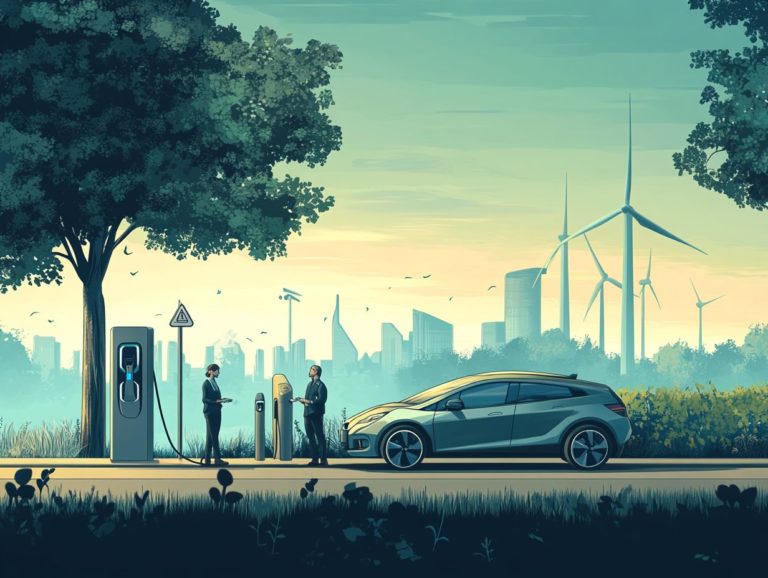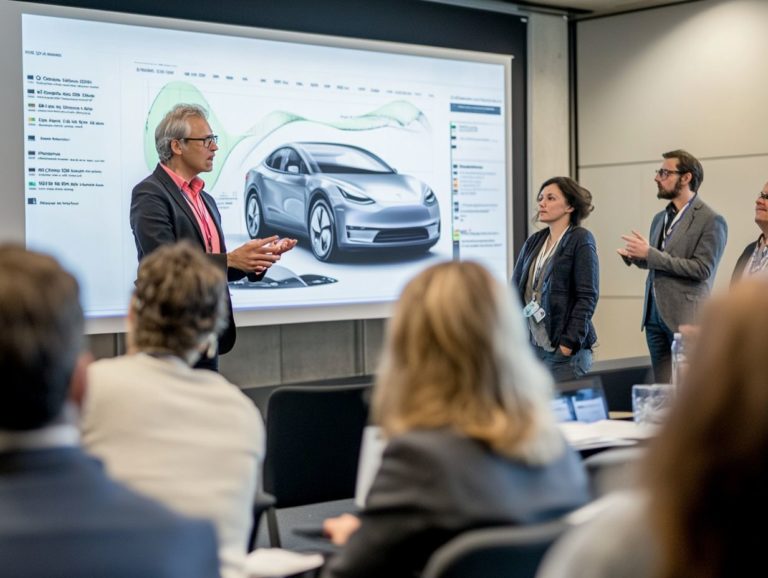Impact of Battery Technology on EV Market Growth
The electric vehicle (EV) market is evolving at an astonishing pace, largely propelled by breakthroughs in battery technology.
As you witness batteries becoming more efficient, affordable, and sustainable, you can appreciate their pivotal role in shaping the future of transportation. This article delves into advancements in battery technology, examining how they impact EV performance and costs. It also explores various factors influencing their development.
It highlights persistent challenges, such as range anxiety and sustainability concerns, while offering predictions for future innovations that could redefine the EV landscape.
Join us as we explore the realm of battery technology and discover how it is fundamentally transforming the future of electric vehicles.
Contents
- Key Takeaways:
- Overview of the Electric Vehicle Market
- Battery Technology and its Role in EV Market Growth
- Factors Affecting Battery Technology Development
- Challenges and Limitations of Current Battery Technology
- Exciting Predictions for Battery Tech and the Electric Vehicle Revolution!
- Frequently Asked Questions
- What is the impact of battery technology on the growth of the electric vehicle market?
- How has battery technology improved in recent years to support the growth of the EV market?
- What role do government incentives play in driving the growth of the EV market in relation to battery technology?
- What challenges does battery technology still face in supporting the growth of the EV market?
- How does the current state of battery technology impact the future growth potential of the EV market?
- What advancements can we expect to see in battery technology in the near future and how will they impact the EV market?
Key Takeaways:
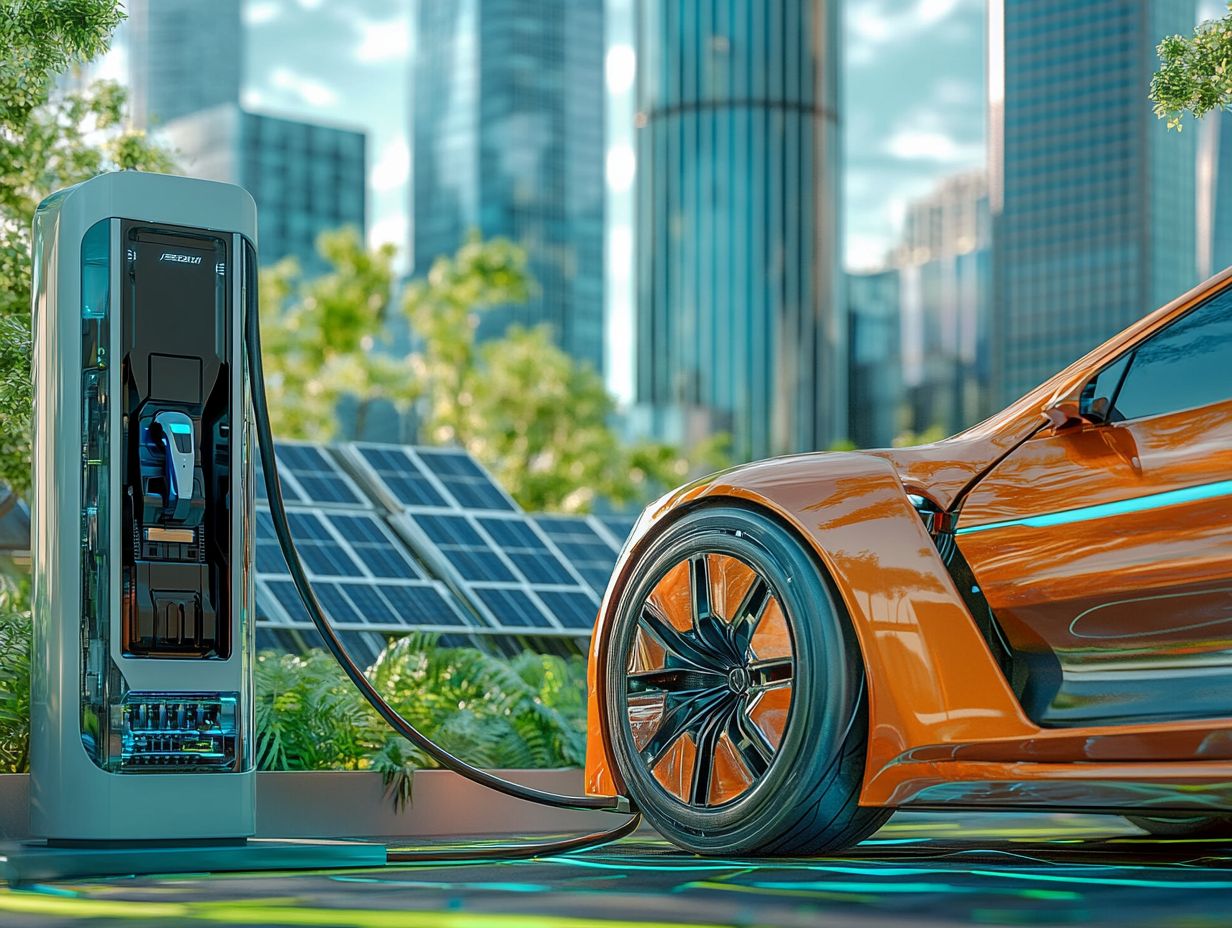
- Advancements in battery technology play a crucial role in the growth of the EV market, making EVs more affordable and improving their performance.
- Government policies and research funding are important factors that influence the development of battery technology and, consequently, the growth of the EV market.
- Challenges such as range anxiety, limited charging infrastructure, and sustainability concerns need to be addressed for the widespread adoption of EVs and continued market growth.
Overview of the Electric Vehicle Market
The electric vehicle (EV) market signifies a profound transformation in the automotive industry, driven by a growing demand for batteries, government initiatives championing clean energy, and a heightened consumer consciousness about transportation emissions.
As global interest in electric vehicles escalates, the market share for EVs steadily expands. Remarkable growth rates are evident in regions such as Europe, the United States, and Asia Pacific.
The RMI report emphasizes the pivotal role of battery technologies in driving this energy transition, underscoring the necessity of sustainable energy solutions for a greener future.
Battery Technology and its Role in EV Market Growth
Battery technology plays a crucial role in the expansion of the electric vehicle market. Breakthroughs in lithium-ion batteries and enhancements in energy density the amount of energy stored in a battery relative to its size are transforming the automotive sector.
As battery costs continue to decrease, more manufacturers are embracing modular technologies. This facilitates the creation of a wide range of electric vehicles, from electric trucks to battery electric passenger cars.
The competitive landscape is swiftly changing, urging manufacturers to seek out sustainable energy solutions and invest in battery innovations that improve both performance and affordability.
Advancements in Battery Technology
Recent advancements in battery technology, especially in lithium-ion, solid-state, and sodium-ion batteries, have notably elevated energy efficiency and performance in electric vehicles. These innovations lead to longer ranges, faster charging times, and better safety features, which in turn influence consumer adoption and drive up EV sales.
Take solid-state batteries, for example; they not only boost energy density but also significantly reduce the risk of overheating, making electric vehicles safer for your daily commute. Meanwhile, ongoing research into sodium-ion technology promises to lower production costs, potentially making these vehicles more accessible for both manufacturers and consumers.
As these technologies advance, they will help create more sustainable energy solutions, reducing reliance on harmful materials and facilitating the shift toward cleaner transportation. Consequently, these advancements are poised to have a profound impact on the electric vehicle landscape, fostering innovations that address growing environmental concerns while ensuring efficiency for drivers like you.
Stay ahead in the EV revolution and learn more about how these technologies can benefit you.
Impact on EV Performance and Affordability
Advancements in battery technology are transforming electric vehicle performance and affordability, resulting in significant cost reductions and heightened market competitiveness.
As lithium-ion battery prices continue to fall, you benefit from improved performance features and greater affordability. This attracts a wider audience to the EV market.
These innovations enhance your electric vehicle’s range and charging speed. They also contribute to a more sustainable future, making EVs an increasingly appealing choice for environmentally conscious consumers like yourself.
With manufacturers rolling out higher-capacity batteries and ultra-fast charging solutions, you’ll enjoy longer journeys on a single charge. This effectively dismantles the barriers that once held back potential buyers.
The growing focus on battery recycling and how batteries are used and disposed of is shaping market trends. This ushers in a new wave of consumer electronics that prioritize sustainability while meeting the demands of modern automotive technology.
Factors Affecting Battery Technology Development
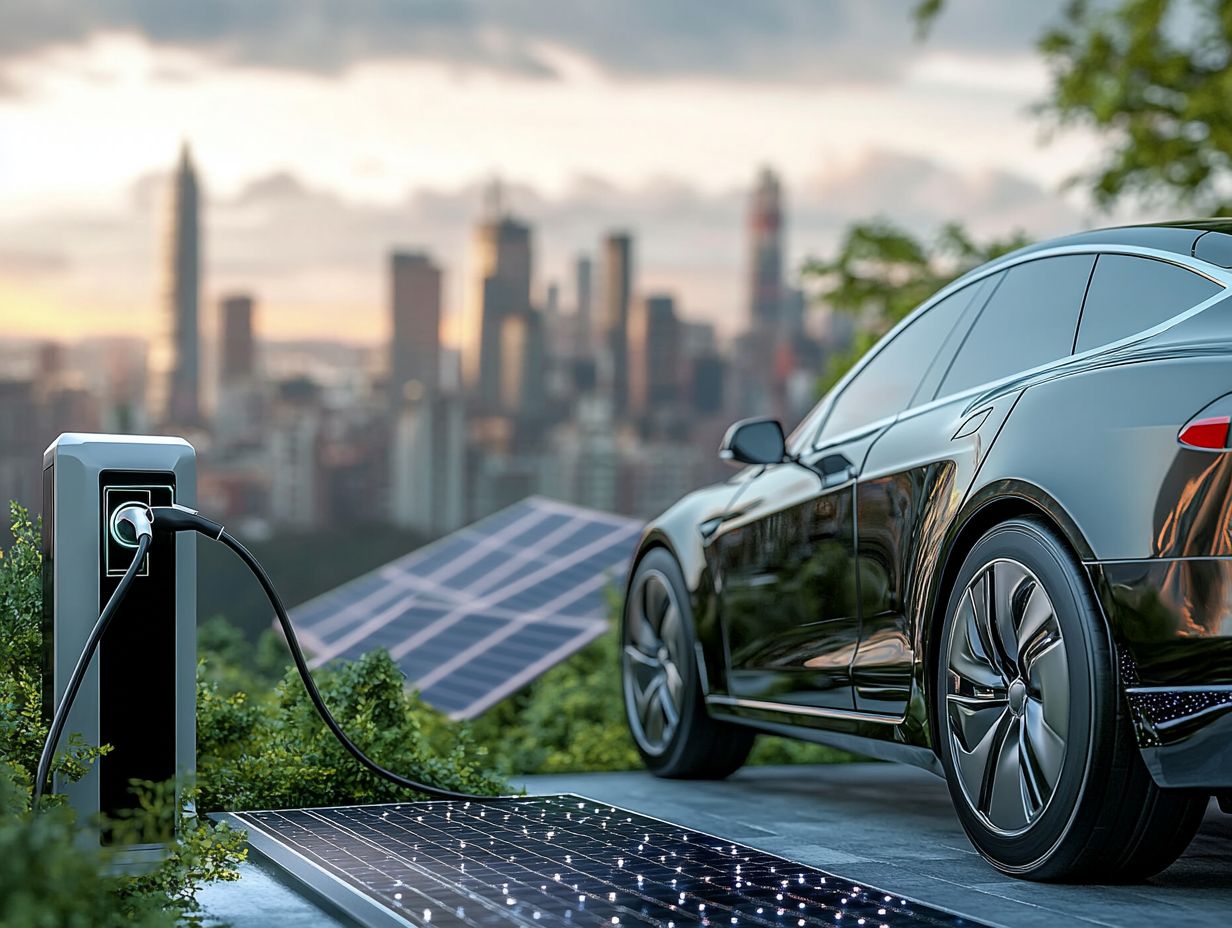
The development of battery technology is shaped by a myriad of factors that you should consider. Government policies promoting sustainable energy practices play a crucial role, along with significant investments in battery manufacturing.
The strategic partnerships forged throughout supply chains are essential. The availability of critical minerals is vital in driving innovation and ensuring the efficient production of batteries for electric vehicles.
Understanding these dynamics will give you valuable insights into the future of energy solutions.
Government Policies and Regulations
Government policies and regulations significantly shape the landscape of battery technology and electric vehicle sales. They drive clean energy initiatives and aim to cut transportation emissions.
According to the RMI report, favorable government incentives can dramatically accelerate adoption rates and enhance the competitiveness of electric vehicles in the automotive market.
Incentives such as tax credits and rebates for EV purchasers substantially reduce the upfront costs for you, making electric vehicles a much more appealing choice.
Subsidies for battery manufacturers boost local production, encouraging innovation and improving efficiency in development.
Stricter emissions standards compel automakers to invest heavily in EV technology. This steers market dynamics towards sustainable alternatives. Ultimately, these combined measures spark consumer interest and motivate manufacturers to innovate.
Now is the time to consider electric vehicles for a more robust and environmentally friendly transportation ecosystem.
Investment and Research Funding
Investment and research funding in battery manufacturing are essential for driving technological advancements and fostering growth within the electric vehicle sector. Increased funding from both public and private sectors is paving the way for exploring innovative battery technologies.
Major automakers and technology firms are deepening their commitment to electrification. They are increasingly partnering with startups and research institutions to accelerate advancements in energy storage solutions.
Government initiatives and incentives offer substantial grants and subsidies designed to spur research into solid-state batteries and other next-generation technologies.
This trend shows that battery technology is crucial for the future of clean transportation and integrating renewable energy. Established players in the battery market are not just expanding their manufacturing capabilities; they are also heavily investing in R&D to maintain their competitive edge.
Ready to make the switch to a cleaner future? Explore your electric vehicle options today!
Challenges and Limitations of Current Battery Technology
Despite remarkable advancements in battery technology, persistent challenges and limitations remain. Range anxiety often looms large in consumers’ minds, while inadequate charging infrastructure hinders the widespread adoption of electric vehicles.
Sustainability concerns about battery manufacturing and end-of-life recycling technologies present critical issues that require attention. Addressing these factors is essential to ensure the long-term viability and cost-effectiveness of electric vehicles.
Range Anxiety and Charging Infrastructure
Range anxiety continues to be a significant hurdle in your journey toward embracing electric vehicles. You might worry about the availability of charging infrastructure and the overall range of EVs. Tackling this issue is vital for enhancing your confidence and aligning market trends with the increasing demand for electric vehicles and consumer electronics.
This concern isn’t just a fleeting hesitation; it deeply influences your purchasing decisions and shapes how you perceive the practicality of daily commutes and longer trips in electric vehicles. Recent studies reveal that potential buyers actively seek reassurance in the form of a reliable and widespread charging network.
As companies and governments invest resources into developing robust infrastructure with fast chargers and strategically placed stations, these efforts will likely boost your confidence in choosing electric vehicles. The success of this initiative could lead to a notable increase in EV sales and broader acceptance of this sustainable mode of transportation, ultimately fostering a transformative shift in consumer behavior.
Sustainability Concerns
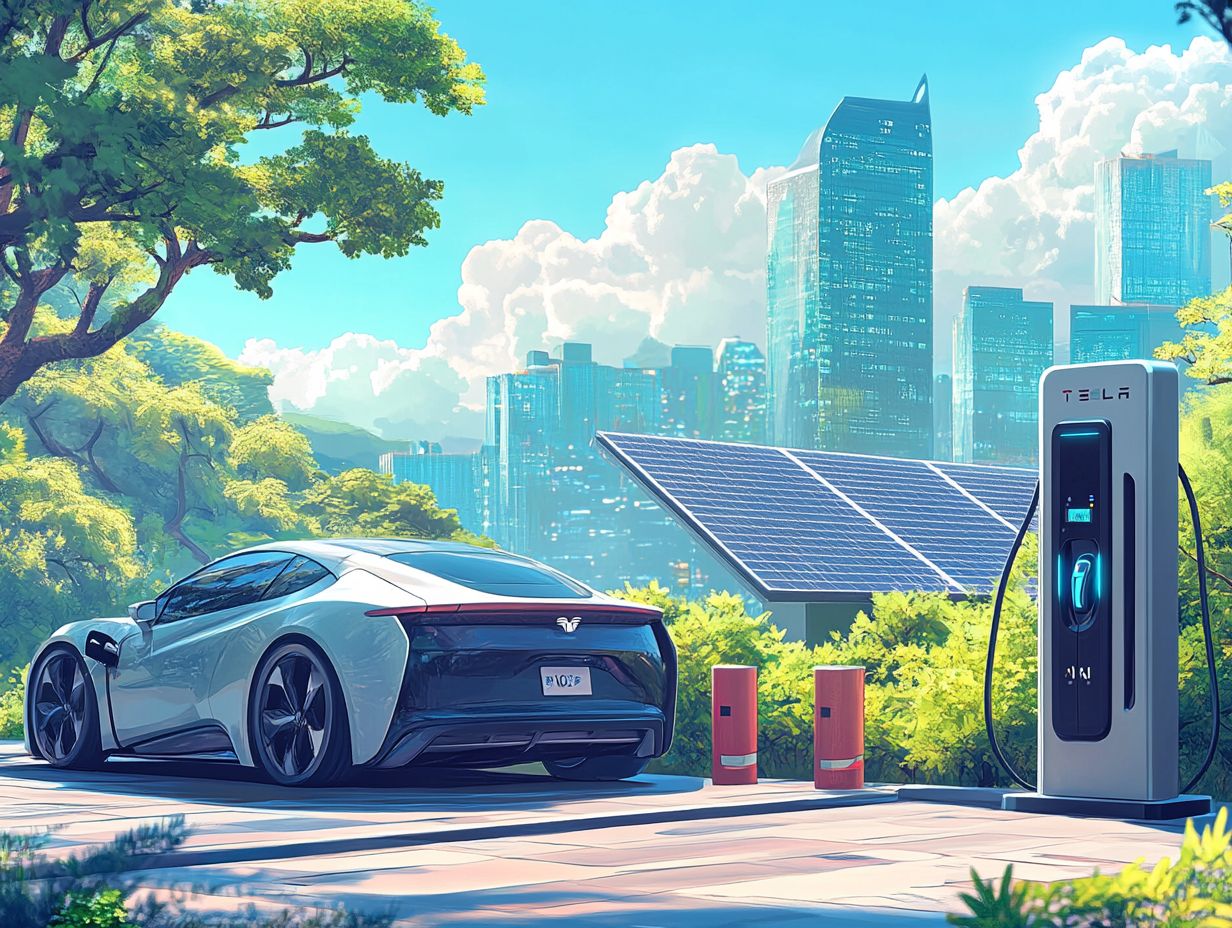
Sustainability concerns are increasingly central to conversations about battery technology, especially regarding sourcing critical minerals and the environmental impact of battery production. Advancements in recycling technologies are crucial for alleviating these concerns and supporting the clean energy objectives tied to electric vehicles.
As the appetite for renewable energy solutions expands, the battery industry faces heightened pressure to refine its resource-intensive operations. The extraction of essential components like lithium, cobalt, and nickel often raises significant environmental and ethical issues, including habitat destruction and questionable labor practices in mining areas.
Consequently, companies are urged to embrace transparent supply chains that emphasize responsible sourcing. By improving recycling methods, they can enhance material recovery and reduce the demand for new mineral extraction. This approach contributes to a more sustainable future, especially as global energy demands continue to rise.
Exciting Predictions for Battery Tech and the Electric Vehicle Revolution!
Predictions for the future of battery technology and the electric vehicle market suggest a landscape poised for remarkable breakthroughs and innovations, particularly in battery types and chemistries.
As the automotive industry evolves, advancements in battery technology will be crucial in shaping the success and sustainability of electric vehicles, paving the way for a more efficient energy transition.
Potential Breakthroughs and Innovations
Potential breakthroughs and innovations in battery technologies, such as solid-state and sodium-ion batteries, are set to redefine performance and safety standards in electric vehicles. These advancements could significantly improve energy density, charging speeds, and overall sustainability.
Consider solid-state batteries: they utilize a solid electrolyte instead of a liquid one, dramatically enhancing safety by minimizing the risk of leaks and fires. Imagine the potential to double the energy density compared to traditional lithium-ion batteries, significantly extending the range of electric vehicles.
On the other hand, sodium-ion batteries present a more abundant and cost-effective alternative, helping to mitigate reliance on scarce minerals like cobalt. Together, these innovations herald a transformative era for the electric vehicle market, paving the way for longer-lasting, faster-charging, and environmentally friendly transportation options.
Stay tuned for these groundbreaking changes that could redefine your driving experience!
The growth and market share for electric vehicles are set to surge. This is driven by falling battery costs and an increasing consumer appetite for sustainable transportation solutions.
As the competitive landscape shifts, it s essential to adapt to these evolving dynamics to take advantage of market chances.
In recent years, the urgency to tackle climate change has nudged more consumers toward electric vehicle adoption. This has prompted companies to innovate and elevate their offerings.
Factors like government incentives, advancements in charging infrastructure, and rising awareness of environmental impacts are pivotal in shaping this burgeoning market.
Key players are honing diverse competitive strategies think collaborations with tech firms and investments in research and development to set their products apart. The industry is on the brink of transformation.
Those who effectively harness these insights will likely find themselves in a prime position within the market.
Frequently Asked Questions
What is the impact of battery technology on the growth of the electric vehicle market?
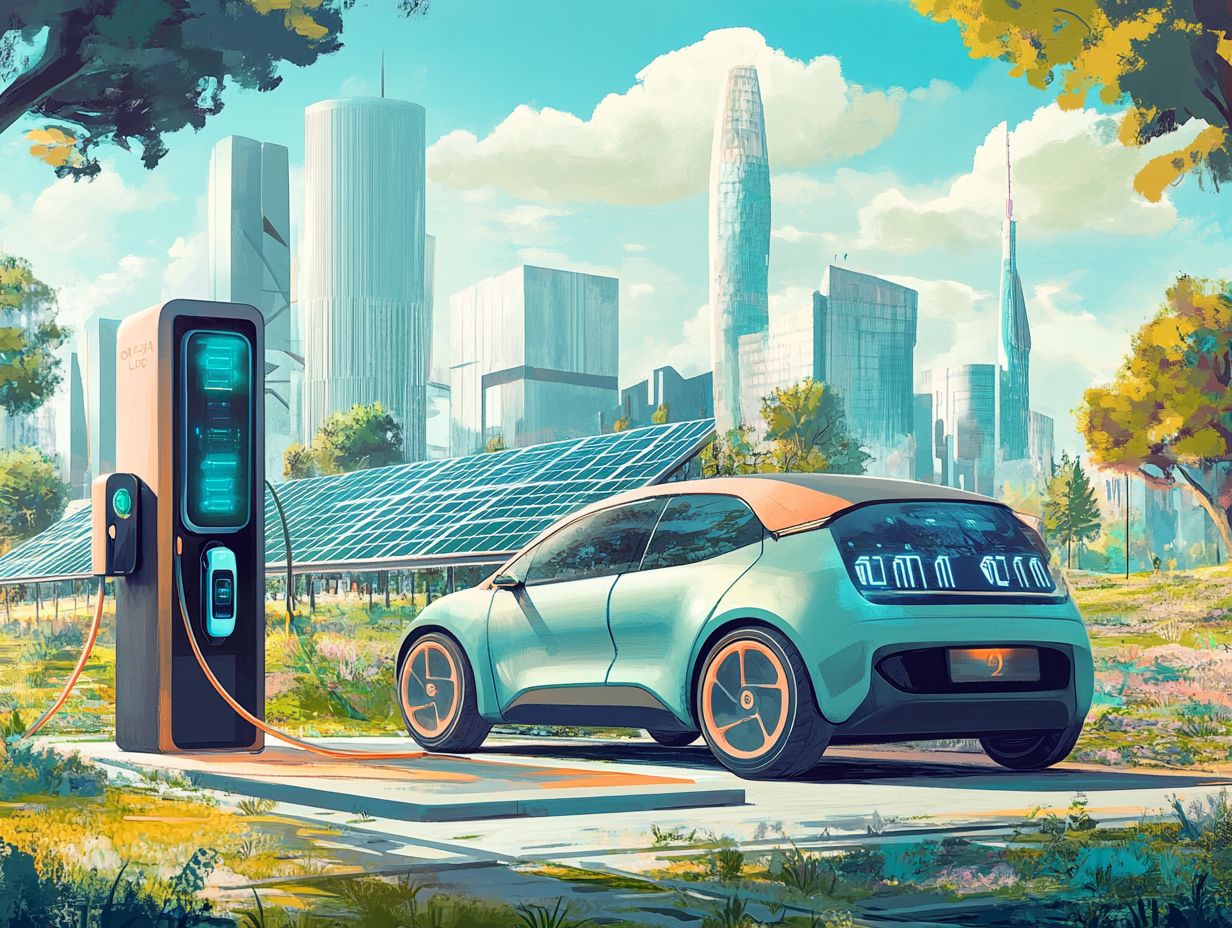
The impact of battery technology on the growth of the electric vehicle market is significant. Advancements in battery technology in EV sustainability have made electric vehicles more efficient and affordable, leading to a rapid increase in their popularity and sales.
How has battery technology improved in recent years to support the growth of the EV market?
In recent years, battery technology has significantly improved. Manufacturers have increased energy density, reduced charging time, and enhanced overall performance and durability, making them more suitable for electric vehicle use.
What role do government incentives play in driving the growth of the EV market in relation to battery technology?
Government incentives, such as tax credits and subsidies, play a crucial role in driving the growth of the EV market. These incentives make EVs more affordable for consumers and encourage manufacturers to invest in advanced battery technology.
What challenges does battery technology still face in supporting the growth of the EV market?
Although battery technology has come a long way, it still faces challenges. These include high production costs, limited range and charging infrastructure, and concerns over the environmental impact of battery production and disposal.
How does the current state of battery technology impact the future growth potential of the EV market?
Battery technology today is a game-changer for the future of EVs! As the latest advances in EV battery technology emerge, we can expect to see more affordable, efficient, and high-performing electric vehicles, driving further market growth.
What advancements can we expect to see in battery technology in the near future and how will they impact the EV market?
In the near future, we can expect advancements like solid-state batteries and improved energy storage capabilities. These innovations will likely lead to widespread adoption of electric vehicles and significant growth in the EV market.

